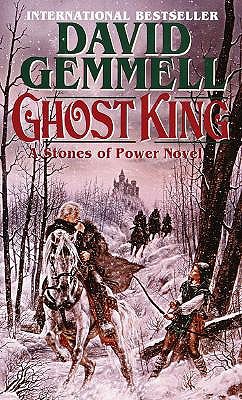 Another review of a David Gemmell book? Yes, because I’m just that much of a fanboy.
Another review of a David Gemmell book? Yes, because I’m just that much of a fanboy.
With the Drenai series finished, I decided to sink my teeth into the Stones of Power series. This series confuses me, because I’ve read The Jerusalem Man, which was retroactively put in as book three, but that’s a post-apocalyptic tale of the gunslinger Jon Shannow, but the series actually starts in Arthurian England. As soon as I got a couple chapters into the first book, though, I began to see the connection.
Ghost King is an alternate history tale of King Arthur (Uther, in the book), and how he rises to become the Blood King of Britannia. His grandfather, Culain, takes him into the mountains after the Brigantes assassinate his father, and there trains him to become a leader and a warrior.
Culain, of course, is one of the immortal Atlantians, just like his friend Maedhlyn (Merlin). After the fall of Atlantis, they have wandered the Earth as gods, using the powers of the Sipstrassi stones to accomplish wonders. Worshipped in turn by the Greeks, the Romans, the Hittites, and the Babylonians, Culain has tired of immortality and now wants to live out a mortal life. But his jilted lover, the Ghost Queen, wants revenge on him for leaving her. She was the one who killed Uther’s grandmother and mother, and who now wants to kill him and rule all of Brittania. But her son Gilgamesh has corrupted her, so that in a parallel universe she must kill twenty pregnant woman every month just to replenish the magic of her Sipstrassi …
Okay, I might as well give up trying to explain the plot, because it only gets crazier. Somewhere in this parallel dimension, a lost Roman legion has been wandering for hundreds of years, consigned to the void by Culain. Also, Gain Avur (Guenevere) is in there too, as well as the Lance Lord (Lancelot), though he doesn’t come in until the epilogue. There are also demons and vampyres, all sorts of battles, and lots of other crazy stuff. It’s pretty freaking dang awesome.
I really enjoyed Uther’s transformation from the weak, bookish boy to the warrior king, as well as the budding of his relationship with Gain Avur (what can I say, I’m a sucker for romance). My favorite character, though, was Prasamaccus, a crippled Brigante peasant who becomes one of Uther’s close advisors. He’s basically a regular guy who gets sucked up into the whole adventure, but he’s level-headed and practical enough that he manages pretty well. He’s also just a good person, which was quite refreshing in a world full of death and drama.
At one point, after rescuing Uther, he’s a guest in Uther’s chief general’s villa. The general gives him a servant girl for the night, since in this world most men think nothing of bedding a slave. Prasamaccus is a peasant, though, and he’s kind of shy. The girl was actually captured in a raid in Germany, where she was raped, and this is her first time bedding someone since those traumati not the monster she’s afraid that he’ll be–they actually share a really tender moment of intimacy that heals much of her trauma and introduces him to the love of his life.c events. She’s absolutely terrified, but so is Prasamaccus–he’s a cripple, and assumes that women just don’t want him. He spends the night with the girl but doesn’t force her to sleep with him, and when she realizes how gentle he is–that she holds the power, and that he’s not the monster she’s afraid that he’ll be–they actually share a really tender moment of intimacy that heals much of her trauma and introduces him to the love of his life.
It’s poignant, story-rich moments like that that make me such a David Gemmell fanboy. Usually they happen in the midst of war, between battle-hardened friends who are forced by circumstance to do something heroic, but they also happen in the quiet moments between characters who carry other scars. That whole thing in the previous paragraph only happened in three pages or so, but it was still so incredibly powerful and moving. Every moment of a David Gemmell book is like that, sometimes from the very first paragraph. It’s awesome.
As far as David Gemmell books go, I’d put this one in about the middle of the pack. It’s not quite as powerful as Legend or Wolf in Shadow, but it doesn’t meander as much as White Wolf or have such an anti-climactic ending as Ironhand’s Daughter (which was probably split by the publisher–more on that when I review The Hawk Eternal). The characters aren’t quite as memorable as Druss, Skilgannon, or Waylander, but they are pretty awesome nonetheless. I’d rate this book a 3 compared to Gemmell’s other books, but a 4.5 out of fantasy overall. Definitely worth a read.